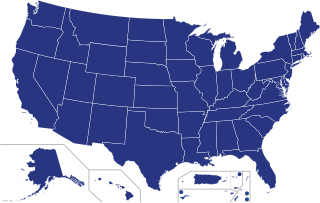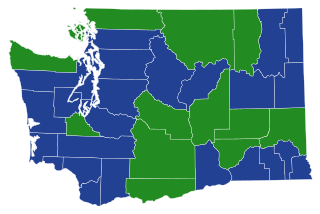
Each of the 50 U.S. states, the District of Columbia, and five territories of the United States holds either primary elections or caucuses to help nominate individual candidates for president of the United States. This process is designed to choose the candidates that will represent their political parties in the general election.

The Iowa caucuses are quadrennial electoral events for the Democratic and Republican parties in the U.S. state of Iowa. Unlike primary elections, where registered voters cast ballots at polling places on election day, Iowa caucuses are meetings where voters gather to discuss and select candidates for their registered party. Political parties hold the caucuses, in contrast to most state-run primaries. Both presidential and midterm elections in Iowa use caucuses. The caucuses are also held to select delegates to county conventions and party committees, among other party activities.

Super Tuesday is the United States presidential primary election day in February or March when the greatest number of U.S. states hold primary elections and caucuses. Approximately one-third of all delegates to the presidential nominating conventions can be won on Super Tuesday, more than on any other day. The results on Super Tuesday are therefore a strong indicator of the likely eventual presidential nominee of each political party.
In American politics, a superdelegate is a delegate to a presidential nominating convention who is seated automatically.

The Nevada presidential caucuses are an electoral event in which citizens met in precinct caucuses to elect delegates to the corresponding county conventions. In 2021, Harry Reid passed legislation (AB321) to include primaries in hopes of increasing voter turn-out. Nevada has for decades and still does have a caucus. The caucus is where the delegates receive the votes that will be carried to the National Convention and not the primaries. There are 17 counties in Nevada and the state has 26 delegates. The Nevada caucuses began in 1981. The Kerry/Dean caucus was held on February 14, 2004. In 2008 the DNC gave Nevada the official first in the west status reflecting the growing importance of the West as well as Nevada's electoral bellwether status. The 2008 Nevada caucuses were the third major electoral event in the nominating process for President of the United States. In 2016, the Democratic caucus was held on February 20 and the Republican caucus was held on February 23.

Presidential primaries and caucuses were organized by the Democratic Party to select the 4,051 delegates to the 2016 Democratic National Convention held July 25–28 and determine the nominee for President in the 2016 United States presidential election. The elections took place within all fifty U.S. states, the District of Columbia, five U.S. territories, and Democrats Abroad and occurred between February 1 and June 14, 2016. Between 2008 and 2020, this was the only Democratic Party primary in which the nominee had never been nor had ever become President of the United States. This was the first time the Democratic primary had nominated a woman for president.

Presidential primaries and caucuses of the Republican Party took place within all 50 U.S. states, the District of Columbia, and five U.S. territories between February 1 and June 7, 2016. These elections selected the 2,472 delegates that were sent to the Republican National Convention. Businessman and reality television personality Donald Trump won the Republican nomination for president of the United States.
The following is a timeline of major events leading up to, during, and after the 2016 United States presidential election. The election was the 58th quadrennial United States presidential election, held on November 8, 2016. The presidential primaries and caucuses were held between February 1 and June 14, 2016, staggered among the 50 states, Washington, D.C., and U.S. territories. The U.S. Congress certified the electoral result on January 6, 2017, and the new president and vice president were inaugurated on January 20, 2017.

This article contains the results of the 2016 Republican presidential primaries and caucuses, the processes by which the Republican Party selected delegates to attend the 2016 Republican National Convention from July 18–21. The series of primaries, caucuses, and state conventions culminated in the national convention, where the delegates cast their votes to formally select a candidate. A simple majority (1,237) of the total delegate votes (2,472) was required to become the party's nominee and was achieved by the nominee, businessman Donald Trump of New York.

The 2016 United States presidential election in Illinois was held on Tuesday, November 8, 2016, as part of the 2016 United States presidential election in which all 50 states plus the District of Columbia participated. Illinois voters chose electors to represent them in the Electoral College via a popular vote, pitting the Republican Party's nominee, businessman Donald Trump, and running mate Indiana Governor Mike Pence against Democratic Party nominee, former Secretary of State Hillary Clinton, and her running mate Virginia Senator Tim Kaine. Illinois had 20 votes in the Electoral College.

The 2016 United States presidential election in Pennsylvania took place on November 8, 2016, as part of the 2016 United States elections in which all 50 states and the District of Columbia participated. Pennsylvania voters chose electors to represent them in the Electoral College via a popular vote.

The 2016 Washington Democratic presidential caucuses were held on March 26, 2016, in the U.S. state of Washington as one of the Democratic Party's primaries ahead of the 2016 presidential election.

The 2016 Wyoming Republican presidential caucuses took place from February 16 until March 1 in the U.S. state of Wyoming as one of the Republican Party's nomination contests ahead of the 2016 presidential election.

Presidential primaries and caucuses of the Republican Party took place in many U.S. states, the District of Columbia, and five U.S. territories from February 3 to August 11, 2020, to elect most of the 2,550 delegates to send to the Republican National Convention. Delegates to the national convention in other states were elected by the respective state party organizations. The delegates to the national convention voted on the first ballot to select Donald Trump as the Republican Party's nominee for president of the United States in the 2020 election, and selected Mike Pence as the vice-presidential nominee.

The 2020 United States presidential election in Iowa was held on Tuesday, November 3, 2020, as part of the 2020 United States presidential election in which all 50 states plus the District of Columbia participated. Iowa voters chose electors to represent them in the Electoral College via a popular vote, pitting the Republican Party's nominee, incumbent President Donald Trump of Florida, and running mate Vice President Mike Pence of Indiana against Democratic Party nominee, former Vice President Joe Biden of Delaware, and his running mate California Senator Kamala Harris. Iowa has six electoral votes in the Electoral College.

The 2020 United States presidential election in Nevada was held on Tuesday, November 3, 2020, as part of the 2020 United States presidential election in which all 50 states plus the District of Columbia participated. Nevada voters chose electors to represent them in the Electoral College via a popular vote, pitting the Republican Party's nominee, incumbent President Donald Trump, and running mate Vice President Mike Pence against Democratic Party nominee, former Vice President Joe Biden, and his running mate California Senator Kamala Harris. Nevada has six votes in the Electoral College.

The 2020 Washington Democratic presidential primary took place on March 10, 2020, as one of several states voting the week after Super Tuesday in the Democratic Party primaries for the 2020 presidential election. The state-run semi-open primary, which was used instead of party-run caucuses for the first time by Washington's Democrats, awarded 109 delegates to the 2020 Democratic National Convention, of which 89 were pledged delegates allocated according to the results of the primary.

Although the Northern Mariana Islands did not participate in the 2020 presidential election because it is a U.S. territory and not a state, it still participated in the U.S. presidential primaries and caucuses. Senator Bernie Sanders won the Democratic caucus, held on March 14, which would be his last win in the 2020 primary season. The Republican caucus, held on March 15 during the party's commonwealth convention, unanimously voted for incumbent President Donald Trump.

Although the United States Virgin Islands did not participate in the 2020 presidential election because it is a U.S. territory and not a state, it still participated in the U.S. presidential caucuses and primaries. Former vice president Joe Biden won the Democratic caucuses, held on June 6. The Republican caucuses, held on March 14 in the form of a territorial convention, voted for incumbent president Donald Trump.

Although Guam did not participate in the 2020 presidential election because it is a U.S. territory and not a state, it still participated in the U.S. presidential primaries and caucuses. Former vice president Joe Biden won the Democratic caucus, held on June 6. The Republican caucus, held on March 14 in the form of a "state convention", endorsed incumbent President Donald Trump.




















